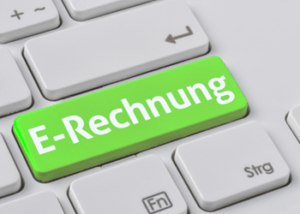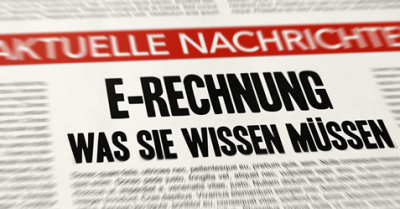
Are you ready for e-billing in 2025?
 The legal changes to e-invoicing will begin on January 1, 2025, when the obligation for the B2B sector to issue and receive e-invoices will apply to all transactions between domestic companies.
The legal changes to e-invoicing will begin on January 1, 2025, when the obligation for the B2B sector to issue and receive e-invoices will apply to all transactions between domestic companies.
Important: A PDF file without an integrated data record (in future: PDF invoice) is not an e-invoice! Avoid costs – start now with us into legally compliant digitization!
From January 1, 2025, e-invoicing will become mandatory – one of the most significant changes in the German accounting system. All companies in the B2B sector are obliged to issue and receive e-invoices (note the transitional regulations, depending on the size of the company). But what does this mean for you in concrete terms? From the definition of e-invoicing to the technical requirements: The changeover affects companies of all sizes – from SMEs to small businesses. The new legal regulation pursues the long-term goal of simplifying processes and effectively combating tax fraud.
Companies that are not prepared in good time risk delays and additional costs.
In this article, you will find out who is affected, which transitional regulations apply and how you can best prepare your company for the new legal regulations. Start now and stay on the safe side!
Why is the e-bill important?
The introduction of mandatory e-invoicing in 2025 marks an important step towards digitalization and increased efficiency in the German accounting system. From January 1, 2025, all companies in the B2B sector must be able to receive e-invoices – regardless of their size. As tax consultants, we would like to prepare you in good time so that your company can easily meet these requirements. The e-invoice is much more than a digital alternative to paper invoices. Thanks to its structured electronic format (e.g. XRechnung or ZUGFeRD from version 2.0.1), it enables automated processing without media disruptions. This not only reduces errors, but also saves time and costs – both in invoicing and in accounting. In addition, the e-invoice supports the traceability and transparency of your business transactions, which is also an advantage during tax audits.
A key driver behind the e-invoicing obligation is the EU initiative “VAT in the Digital Age” (ViDA), which aims to combat VAT fraud and modernize tax law across Europe. For you as a business owner, this means: act now! The changeover to e-invoicing often requires adjustments to IT systems and processes. We support you with our expertise and powerful solutions such as the well-known DATEV applications, which meet all requirements and make your day-to-day work easier.
Take the opportunity not only to meet legal requirements, but also to increase the efficiency of your processes. Together we will ensure that your company is optimally prepared for the future!

Who is affected by the e-invoicing obligation?
The 2025 e-invoicing obligation affects all transactions between domestic companies (domestic B2B transactions).
This means that you are obliged to be able to receive e-invoices (an e-mail inbox is sufficient for this) and to validate them to ensure that the e-invoice complies with the legal format (in particular the DIN standard EN16931). Only then is the input tax deduction from this invoice guaranteed. This obligation applies regardless of the size of the company – even small businesses and freelancers are not exempt.
Important: From January 1, 2025, all domestic companies must be technically capable of receiving e-invoices in the prescribed format (in particular XRechnung or ZUGFeRD from version 2.0.1). A simple PDF is not an e-invoice and does not meet the requirements!
You are also obliged to issue e-invoices, unless an exception or transitional regulations apply to you.
Exceptions to the obligation to issue e-invoices
- Invoices to private individuals (B2C sales).
- Tax-free transactions, e.g. tax-free letting and leasing, certain financial or healthcare services, etc. (§ 4 no. 8-29 UStG).
- Small business
- Small value invoices up to 250 €.
- Tickets (for the transportation of passengers)
Our tip as a tax consultant: Make sure that your IT systems and processes are adapted to the new requirements in good time. Use DATEV solutions to work efficiently and in compliance with the law. Contact us – we will help you to comply with the legal requirements and take advantage of the benefits of e-invoicing for your company!
Timetable and transition periods for e-billing
The introduction of mandatory e-invoicing will take place in several stages in order to give companies sufficient time to adapt their systems and processes. As your tax advisor, we would like to provide you with a clear overview of the timetable and transition periods so that you are prepared in good time.
From January 1, 2025: Obligation to receive and retain data
All companies in Germany must be able to receive e-invoices from this date. It does not matter whether it is a small business, a freelancer or a large company.
The structured part of the e-invoice must be stored in such a way that it is available in its original form and cannot be changed in accordance with the legal requirements. It must be ensured that the tax office can evaluate the invoice automatically.
Until December 31, 2026: Transitional period for shipping
- Transitional regulations apply to the sending of e-invoices until the end of 2026. During this time, companies may continue to issue “other invoices”. The issue of a paper invoice is permitted for VAT purposes even without the recipient’s consent during this period; the issue of another electronic invoice (such as a PDF invoice) requires the recipient’s consent (can also be implied, i.e. if the recipient tacitly accepts this).
paper invoices or, with the consent of the recipient, other electronic invoices (e.g. PDF).
From January 1, 2027: mandatory shipping for larger companies
Companies with a previous year’ s turnover of over € 800,000 must send e-invoices from this date. Smaller companies with a previous year’s turnover of less than € 800,000 may continue to send “other invoices” until the end of 2027.
The same applies to the EDI procedure.
From January 1, 2028: Compulsory shipping for all
From this date, e-invoicing will be mandatory for all domestic B2B sales. This also removes the option of using alternative invoice formats.
EDI systems must be adapted to the legal requirements.
Our advice: Use the transition periods to adapt your systems in good time.
What exactly is an e-bill?
An e-invoice is much more than a digitized invoice. It is an invoice that is created, transmitted and received in a structured electronic format and enables electronic processing. This format enables automated processing without manual intervention – a significant advantage over paper or other types of invoice.
Technical requirements
For an invoice to be considered an e-invoice, it must be in a permissible electronic format. An e-invoice that complies with the European standard EN 16931 is always permissible. Common formats in Germany are
- XRechnung: A purely structured XML data set without a visual component.
- ZUGFeRD 2.x: A hybrid format with a combination of PDF and XML data record. While the PDF makes the invoice readable, the XML file contains the structured data for automated further processing. In most cases, the XML file is embedded in the PDF file as an attachment.
Simple PDF or paper invoices do not meet these requirements and are considered “other invoices”, which will no longer be permitted from 2028, at least in the B2B sector.
Key advantages of the e-bill
E-invoices make accounting easier as they can be processed, checked and archived automatically. This saves time, reduces errors and ensures greater transparency in your business processes. In addition, the legal requirements for traceability and retention obligations are fully met.
Our recommendation as a tax consultant
Prepare for the e-invoicing obligation in good time. With DATEV ‘s software solutions, you can create, receive and process e-invoices in compliance with the law – easily and efficiently. As your tax consultant, we support you during the changeover and ensure that you benefit from the advantages of digitization.
Contact us to ensure together that your company is optimally prepared!
Advantages of the e-bill for companies
E-invoicing offers companies a wide range of benefits – over and above the mere fulfillment of legal obligations. As tax consultants, we would like to show you why the changeover is worthwhile and how you can benefit from it.
Efficiency and time savings: e-invoices enable automated processing. Manual entry of invoice data is no longer necessary, which reduces errors and speeds up work processes considerably. This not only saves time, but also reduces the workload of your employees.
Cost reduction: The digitization of invoice processes eliminates costs for paper, printing and shipping. In addition, the faster processing of incoming invoices enables better use of discount periods and optimizes your cash management.
Fewer errors and greater transparency: e-invoices minimize sources of error as data is transmitted without media discontinuity. At the same time, traceability in your accounting processes is increased. This is not only helpful for internal evaluations, but is also a great advantage during tax audits.
Sustainability and future-proofing: Switching to electronic invoices contributes to environmental friendliness. Using less paper means conserving resources and strengthens your sustainable corporate image. With e-invoicing, you are ideally prepared for future requirements, such as the introduction of a transaction-based reporting system from 2028 as part of the EU’s “VAT in the Digital Age” initiative.
Our recommendation: Use the changeover not only to comply with the e-invoicing obligation, but also as an opportunity to optimize your business processes. We support our clients with the implementation!
What companies should do now
The 2025 e-invoicing obligation is just around the corner – it’s high time to set the course for a smooth transition. As your tax advisor, we would like to provide you with specific steps so that you can meet all requirements in good time and take advantage of the benefits of digitalization.
1. check and adapt systems
2. adapt processes
3. train employees
4. inform business partners
Check your current IT systems: Can they receive and process e-invoices in the prescribed format (e.g. XRechnung or ZUGFeRD from version 2.0.1)? If not, an extension or conversion is necessary. DATEV offers you a legally compliant and efficient solution. Adapt your internal processes to the requirements of e-invoicing:
– Set up a central e-mail address for receiving invoices, e.g. “rechnung@ihrunternehmen.de”.
– Ensure that your accounting software processes e-invoices without media discontinuity.
– Develop clear workflows for checking, approving and archiving e-invoices.
Train your teams in the use of e-invoicing. This includes both technical handling and knowledge of the legal requirements in order to avoid errors and uncertainties. Communicate with your suppliers and customers at an early stage. Clarify how the exchange of e-invoices should take place and inform all business partners of your reception options.

Why DATEV? Our solution for your requirements
The introduction of mandatory e-invoicing in 2025 presents many companies with technical and organizational challenges. As tax consultants, we rely on proven and future-proof solutions to make the transition as easy as possible for you.
The DATEV solutions are 100% legally compliant and future-proof, they are fully aligned with the legal requirements and are automatically updated when changes are made. This means that you will always be up to date with future developments such as the transaction-based reporting system. With DATEV solutions, you can easily receive, create and process e-invoices. Efficient processes save time, reduce costs and minimize errors.
The flexibility and expandability of the DATEV solution are outstanding: they can be flexibly adapted to your individual requirements. It supports common formats such as XRechnung and ZUGFeRD and offers interfaces to partner solutions and networks such as Peppol and TRAFFIQX. The DATEV e-invoicing platform is very easy to get started with, it is intuitive to use and can be used straight away – with a free trial phase and optional additional functions that you can book as required. This way, you can get started with the digital future of your invoicing processes without much effort.
Start the changeover to e-invoicing now. As your tax advisor, we naturally support our clients with implementation, training and process optimization. Let’s work together to ensure that your company is optimally prepared – contact us for a personal consultation!
Together, we will ensure that your company is optimally prepared for the requirements of mandatory e-invoicing in 2025.
